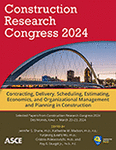Review of Effective Practices for Managing Utility Coordination Stakeholders in Highway Projects
Publication: Construction Research Congress 2024
ABSTRACT
The increased proliferation of utility infrastructure within the public right-of-way has become a growing challenge. Today’s highway projects typically require interaction with many utility owners because of the increasingly complex utility infrastructure. Researchers have investigated different practices for effective utility coordination, including better communication and timely involvement of all stakeholders. Unfortunately, insufficient communication and coordination between utility stakeholders remain highly cited problems. Practitioners strongly believe that applying basic project management to utility issues can help alleviate those problems. Under the project management heading, stakeholder management is considered one of the most important tools and issues to project success. This fact, coupled with the persisting inefficiencies regarding communication and coordination among utility stakeholders, has created the need for a comprehensive review of stakeholder management literature in the utility coordination domain. This study aims to address this gap by analyzing the study interest of scholars in this field. Researchers conducted a systematic literature review that gathered relevant information from journal and conference papers and research reports. This information was categorized into the three well-known stakeholder theory approaches—descriptive, instrumental, and normative. The results revealed directions for future research regarding stakeholder management in utility coordination on highway projects.
Get full access to this article
View all available purchase options and get full access to this chapter.
REFERENCES
Armour, R., D. Rose, S. Butler, and T. Water. 2022. Assessment of techniques for corridor preservation in South Dakota. South Dakota Department of Transportation.
Cambridge Systematics, Inc. 2006. Best Practices in Right-of-Way acquisition and utility relocation. National Cooperative Highway Research Program. Cambridge, Massachusetts.
Donaldson, T., and L. Preston. 1995. “The stakeholder theory of the corporation: Concepts, evidence, and implications.” Academy of Management Review. 20 (1), 65–91.
Elias, A., R. Cavana, and L. Skuba. 2000. “Linking stakeholder literature and system dynamics: Opportunities for research.” 1st International Conference on Systems Thinking in Management. Geelong, Australia, November 8-10.
Ellis, R., M. Venner, C. Paulsen, J. Anspach, G. Adams, and K. Vandenberg. 2009. Integrating the priorities of transportation agencies and utility companies. Washington, DC: The National Academies Press. doi: https://doi.org/10.17226/23037.
El-Naway, O., I. Mahdi, M. Badwy, and A. Gamal. 2015. “Developing methodology for stakeholder management to achieve project success.” International Journal of Innovative Research in Science, Engineering, and Technology, 4. DOI:https://doi.org/10.15680/IJIRSET.2015.0411046.
FHWA (Federal Highway Administration). 2002. Avoiding utility relocations. US Department of Transportation, Federal Highway Administration, Research, Development, and Technology.
Freeman, E. 1984. Strategic management: A stakeholder approach. Boston: Pitman Publishing.
Jergeas, G., E. Williamson, G. Skulmoski, and J. Thomas. 2000. “Stakeholder management on construction projects.” 2000 AACE International Transactions.
Jones, T. 1995. “Instrumental stakeholder theory: A synthesis of ethics and economics.” Academy of Management Review. 20 (2), 404–437.
Karlsen, J. T. 2002. “Project Stakeholder Management.” Engineering Management Journal. 14 (4). DOI: https://doi.org/10.1080/10429247.2002.11415180.
Kraus, E. 2014. “Managing longitudinal utility installations on controlled access highway right-of-way –.” National Cooperative Highway Research Program. Texas A&M Transportation Institute. San Antonio, Texas.
Moher, D., A. Liberati, J. Tetzlaff, and D. Altman. 2009. “Preferred reporting items for systematic reviews and meta-analyses: The PRISMA statement.” British Medical Journal.
O’Connor, J., C. Caldas, C. Chou, A. Sroka, and G. Goldman. 2007. Effectiveness of the combined transportation and utility construction strategy. The University of Texas at Austin. Texas, Austin.
PMI (Project Management Institute). 2017. A guide to the project management body of knowledge PMBOK guide (6th Edition ed.). Newtown Square, Pennsylvania.
Quiroga, C., Y. Li, E. Kraus, and J. Jerry. 2013. Optimizing utility owner participation in the project development and delivery process. Austin, Texas: Texas Department of Transportation.
Quiroga, C., J. Anspach, P. Scott, and E. Kraus. 2018. Feasibility of mapping and marking underground utilities by the state department. Office of Research and Technology Services.
Quiroga, C., E. Kraus, Y. Li, and J. Le. 2012. Strategies to encourage and facilitate utility owner participation in transportation projects. Texas Department of Transportation. College Station, Texas.
Quiroga, C., E. Kraus, J. Overman, and N. Koncz. 2009. Integrating utility conflict elimination and environmental processes. Transportation Research Institute, Houston, Texas.
Quiroga, C., J. McCleve, R. Lee, E. Kraus, J. Anspach, R. Sturgill, and J. Cooper. 2019. Strategic research needs in the area of utilities. Washington DC: Transportation Research Board.
Quiroga, C., et al. 2014. Strategies to optimize real property acquisition, relocation assistance, and property management practices. Transportation Research Board, DC.
Semsick, D., and T. O’Brien. 2009. Effective utility accommodation. Pennsylvania Department of Transportation. Harrisburg, PA.
Smutzer, R., T. Brunner, J. Scheider, and K. Downey. 2004. Solutions for reconstructing Hoosier highways. Indiana Department of Transportation.
Sturgill, R., T. Taylor, and Y. Li. 2017. Effective utility coordination: Application of research and current practices. Washington DC: The National Academies Press.
Sturgill, R., T. Taylor, S. Ghorashinezhad, and J. Zhang. 2014. Methods to expedite and streamline utility relocations for road projects. Kentucky Transportation Center. Lexington, Kentucky.
Thomas, R., and R. Ellis. 2001. Avoiding delays during the construction phase of highway projects. Washington DC: Transportation Research Board. National Research Council.
Thorne, J., D. Turner, and J. Lindly. 1993. Highway/utility guide. Washington DC: American Public Works Association. Federal Highway Administration.
Yang, J., Q. Shen, and M. Ho. 2009. “An overview of previous studies in stakeholder management and its implications for the construction industry.” Journal of Facilities Management. 7, 159–175.
Yang, J. 2010. A framework for stakeholder management in construction projects. Doctoral dissertation. Kowloon, Hong Kong: Pao Yue-Kong Library. The Hong Kong Polytechnic University.
Williams, R. 1997. Coordinating Utility relocations as a function of state highway agencies. West Virginia Department of Transportation. Virginia.
Information & Authors
Information
Published In
History
Published online: Mar 18, 2024
Authors
Metrics & Citations
Metrics
Citations
Download citation
If you have the appropriate software installed, you can download article citation data to the citation manager of your choice. Simply select your manager software from the list below and click Download.
